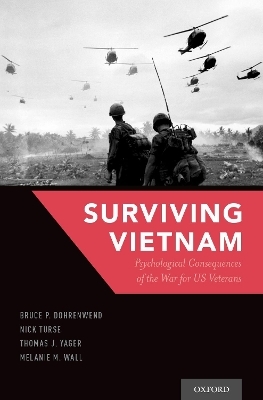
Surviving Vietnam
Oxford University Press Inc (Verlag)
978-0-19-090444-9 (ISBN)
The war in Vietnam is a watershed moment in United States history -- the first war lost by the U.S. despite its seemingly overwhelming military might. Surviving Vietnam focuses on the psychological consequences, especially posttraumatic stress disorder (PTSD), of service in such a war for U.S. veterans.
The diagnosis of PTSD, termed following and significantly influenced by this war, stirred controversy. Much of the initial controversy centered on a major report in 1990 of what numerous critics regarded as unrealistically high rates of this disorder in U.S. veterans. Controversy continues about whether exposure to one or more potentially traumatic events is more significant to the development and persistence of PTSD than pre-exposure personal vulnerability factors, such as age, education and prior psychiatric disorder. This book describes attempts to resolve these controversies.
Surviving Vietnam develops a unique blend of historical material, military records, clinical diagnoses of PTSD, and interviews with representative samples of veterans surveyed approximately a decade (the National Vietnam Veterans Readjustment Study) and nearly four decades (the National Vietnam Veterans Longitudinal Study) after the war's conclusion.
The book begins with a history of the Vietnam war that provides context for the discussions of mental health thereafter, the outcomes of the severity of veterans' exposure to combat, their personal involvement in harm to civilians and prisoners, their race-ethnicity, and their military assignments. It discusses nurses' experiences in Vietnam and the psychological impact of veterans' chronic war-related PTSD on their families.
Surviving Vietnam then examines factors affecting veterans' post-war readjustment, including the effects of changing public and veteran attitudes toward the war and the veterans' own appraisals of the impact of the war on their lives after the war. The authors conclude with a discussion of the policy implications of the research findings.
Bruce P. Dohrenwend, PhD Chief of Research Division of Social Psychiatry New York State Psychiatric Institute Professor of Social Science and Foundations Fund for Research in Psychiatry Professor Department of Psychiatry Professor of Epidemiology Department of Epidemiology Mailman School of Public Health Columbia University New York, New York Nick Turse, PhD Historian and Journalist The Nation Institute New York, New York Thomas J. Yager, PhD Research Scientist Department of Epidemiology Mailman School of Public Health Columbia University New York, New York Melanie M. Wall, PhD Director, Mental Health Data Science Department of Psychiatry Professor of Biostatistics Department of Biostatistics Mailman School of Public Health Columbia University Research Foundation for Mental Hygiene, and New York State Psychiatric Institute New York, New York
Acknowledgements
Preface
Contributors
PART I: Historical Context
1. Prelude, War and Aftermath
PART II: Veterans' War-zone Experiences and Posttraumatic Stress Disorder
2. Controversies about Rates of Posttraumatic Stress Disorder in U.S. Veterans
3. Measurement of Severity of Combat Exposure, Involvement in Harming Civilians and Prisoners, and Personal Vulnerability Load
4. A Puzzle About What the NVVRS "Projected Probability of Current PTSD" Measures
5. The Roles of Combat Exposure, Personal Vulnerability, and Involvement in Harm to Civilians or Prisoners in War-related Posttraumatic Stress Disorder
6. Harming Civilians or Prisoners: Characteristics of Persons and Situations
7. War-related PTSD in Black, Hispanic, and Majority White Veterans: The Roles of Potentially Traumatic Exposure and Vulnerability
8. PTSD in Women Who Served as Nurses in Vietnam
9. Families of Veterans: The Question of Secondary Traumatization
PART III: Veterans' Post-war Readjustment
10. Some Psychological Effects of Changing Public Attitudes on U.S. Vietnam Veterans
11. Veterans' Appraisals of the Impact of the War on Their Lives 10 Plus Years After the War Ended
12. Long-term Impact of the War on Veterans' Lives Nearly 40 Years After the War Ended
PART IV: Policy Implications
13. Some Implications for Policy
Epilogue
| Erscheinungsdatum | 19.11.2018 |
|---|---|
| Verlagsort | New York |
| Sprache | englisch |
| Maße | 239 x 160 mm |
| Gewicht | 635 g |
| Themenwelt | Medizin / Pharmazie ► Medizinische Fachgebiete ► Psychiatrie / Psychotherapie |
| Studium ► Querschnittsbereiche ► Prävention / Gesundheitsförderung | |
| ISBN-10 | 0-19-090444-5 / 0190904445 |
| ISBN-13 | 978-0-19-090444-9 / 9780190904449 |
| Zustand | Neuware |
| Informationen gemäß Produktsicherheitsverordnung (GPSR) | |
| Haben Sie eine Frage zum Produkt? |
aus dem Bereich


